The German director Volker Schlöndorff, an emblematic figure of the New German cinema and winner of the Oscar and Palme d’Or for The Tin Drum, was the guest of honor at the Evia Film Project promoted by the Thessaloniki Film Festival, which closed on 19 June with the screening of his film The Forest Maker, followed by a Q&A with the audience, to which he lent an affability and closeness that encouraged the spectators in a conversation that would have lasted until late into the night. The session, which was free of charge, took place next to the sea, in the Apollon cinema of Edipsos, rehabilitated after thirty years of closure, in one of the laudable initiatives carried out by this innovative project that aims to revive an island ravaged by forest fires. A few hours earlier, the veteran director joined the press at the event for a relaxed and jovial chat on a sunny morning next to the legendary thermal springs that give their name to the town of Edipsos and whose sediment modifies the coastline as it meets the sea.
The director visited the area of the island that had been devastated by fire and was as impressed by it as he was by the aftermath of the eruption of Mount St. Helens in the United States thirty years earlier. Influenced by his three years of contact with Tony Rinaudo —a reference in reforestation—, and his methods, he proposed that they let nature act and reforest for 20 years, without immediately cutting down the burnt trees until new sprouts were seen, I should ask Tony and send him a photo.
Although it may come as a surprise as a career turn, the director was already involved in an environmental documentary 60 years ago: My first documentary was in 1962. We did the tour of the Mediterranean, actually, the film is called “Mediterranean”, with Jean-Daniel Pollet, always taking the next slide so that we ended up you know, in Gibraltar. And he has recently traveled several times to Africa Because I’m engaged in Africa for 14 years now in Rwanda with the film school. So to me it was not unexpected, it was only unexpected for you. How come he is doing a documentary? Yeah.
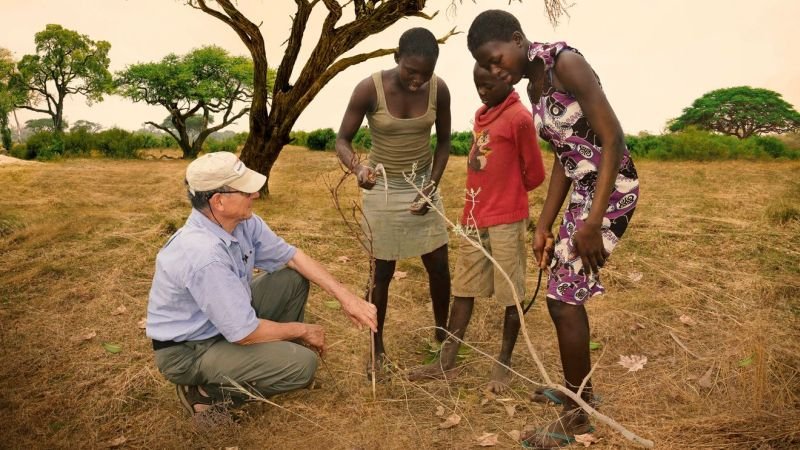
The documentary The Forest Maker introduces us to the remarkable title character, Tony Rinaudo, the Australian who has spread his reforestation method, FMNR, throughout Africa, which manages to grow trees in arid areas. Schlöndorff admires his protagonist so much that he allows himself to joke about the name: Farmer managed natural regeneration. That’s what Tony called his own thing. It’s not very catchy, any marketing expert would find it better. The two met after Rinaudo received the alternative Nobel Prize, the Right Livelihood Award, when he passed through Berlin on his way back from Stockholm and met with some 45 people: And I had been invited to it, and I was so struck by his personality… is a good protagonist, but by the simplicity of this method, so I went to see him afterward. And I said, “Well, this is so fantastic. You must have 1000s of disciples now all over the world who practice this and teachers”. And he said, “mostly, I’m alone”. I said, “this has to change. Do you want me to make a movie about you?” And he caught my eye. And I was stuck to do a documentary. When did this happen? In December 2018. And then, six weeks later, I met him in Bamako, Mali, and we started…
This is not about filmmaking, for me, this is really propaganda in a sense. It’s activism.
Regarding preparations and production, the director confesses that there were none: I think this type of documentary is okay. But of course, I did not expect that it was going to last for years. First, I had to go back to find that money because I started just with pocket money. And, and when I had the money Tony was stuck in, in Australia. So it took a long time. They both went to Africa about eight times, always for two or three weeks, and then We spend a month in India, which is not even in the movie. Because the Africans and the Indians didn’t mix well together. It was two worlds and was very confusing. Same method, but different farmers.
As the documentary shows us, Rinaudo is a respected figure, nicknamed “The Boss of All Farmers”, but he is still fighting hard to put his ideas into action 30 years after his beginnings. In that long journey he witnessed hunger and despair, but also, as we see, resilience and a desire for change, so the message the film conveys is one of empowerment and hope. As Schlöndorff acknowledges, I went to Africa as a pessimist and I came back as an optimist. Yes, yes. I wouldn’t be here and I’m trying to bring this movie. This is not about filmmaking, for me, this is really propaganda in a sense. It’s activism. Because there are resources, there is enough workforce to do everything.
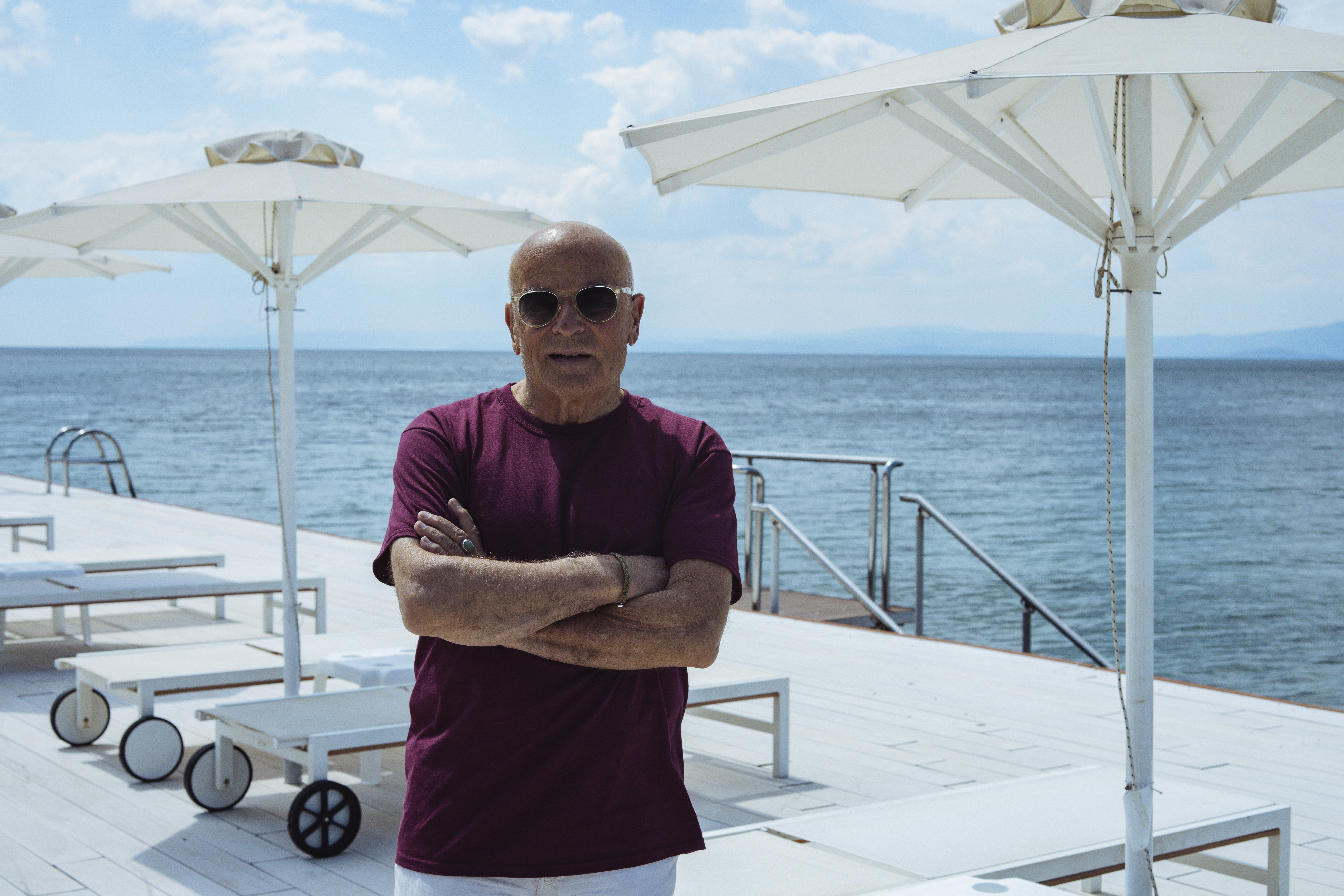
Volker Schlöndorff. Foto: Nikos Nikolopoulos (cortesía Evia Film Project).
Schlöndorff worked with minimal equipment, while he operated a small digital camera for close-ups, as can be seen in the film. As for the editing, it was influenced by the unprepared approach to filming, So I didn’t have really a concept. And so the editing alone took five months. I mean, just to go through all the material to find a form. Should it be like a country by country geographically, or should it be like a travelogue day by day, a diary? And then I ended up which is more cinematic. Firstly, agriculture, migration, and education are different themes. You know, always without caring which country.
Throughout the film, the figure of Rinaudo remains a presence, even if he is not still on screen, and the focus opens up to include characters and families, dramas, and hopes of a ravaged continent. In the end, it is a story about people because people are responsible for what they have done to the environment and they are also the ones who have what it takes to get involved. But, are they willing? Well, you know, as I had no concept, of course, first I was interested in the agriculture industries. And how does he do it? But soon, I found the people more interesting than the agriculture. And, and they are very open. You know, we could enter anywhere. Because we did not disturb. My crew was never more than three, meaning myself and local cameraman, and the local soundman. In each country, I changed because we had low budgets, Senegal, Mali, Burkina Faso, Ghana, and Ethiopia.
The documentary format, which the director himself has described as a documentary essay, includes three short films by the African directors Idriss Diabaté and Alassane Diago, as small clips, which provide their own energy and testimony, and were commissioned by him expressly for the film, according to what he told us. On the other hand, the need to express his message in the most appropriate way also led him to convey it through animation, as a communicative rather than an aesthetic decision.
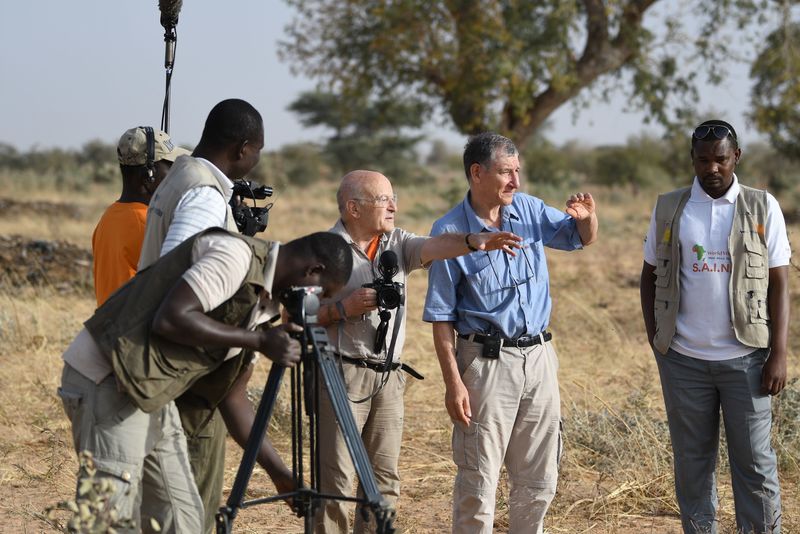
Schlöndorff had visited Africa many times over the course of 14 years, But I’ve never been to the countryside in 14 years, I spent most of my time in the cities, in Nairobi and Kigali where it is this film school I have taken care of, or in that car, but usually, you don’t get out into the country. And I would never have penetrated this side of agricultural Africa without Tony because he spent 40 years of his life there. And the incredibly positive attitudes, because as Tony says, Africa could feed itself, it could even feed the world is unbelievable to this day. I don’t really know what to make of it. But I mean, theoretically, it seems there is enough land. 350 million people cannot really live with the current methods, and with climate change, they cannot produce enough food. So there’s a major change. It shouldn’t happen there. But no, it’s strange that all the development programs do not care much about agriculture and the rural. Agriculture is everything, and 70% of Africans still live in the country. So I mean, if I was Minister of Agriculture, or whatever, for development for all of that, I would say agriculture first.
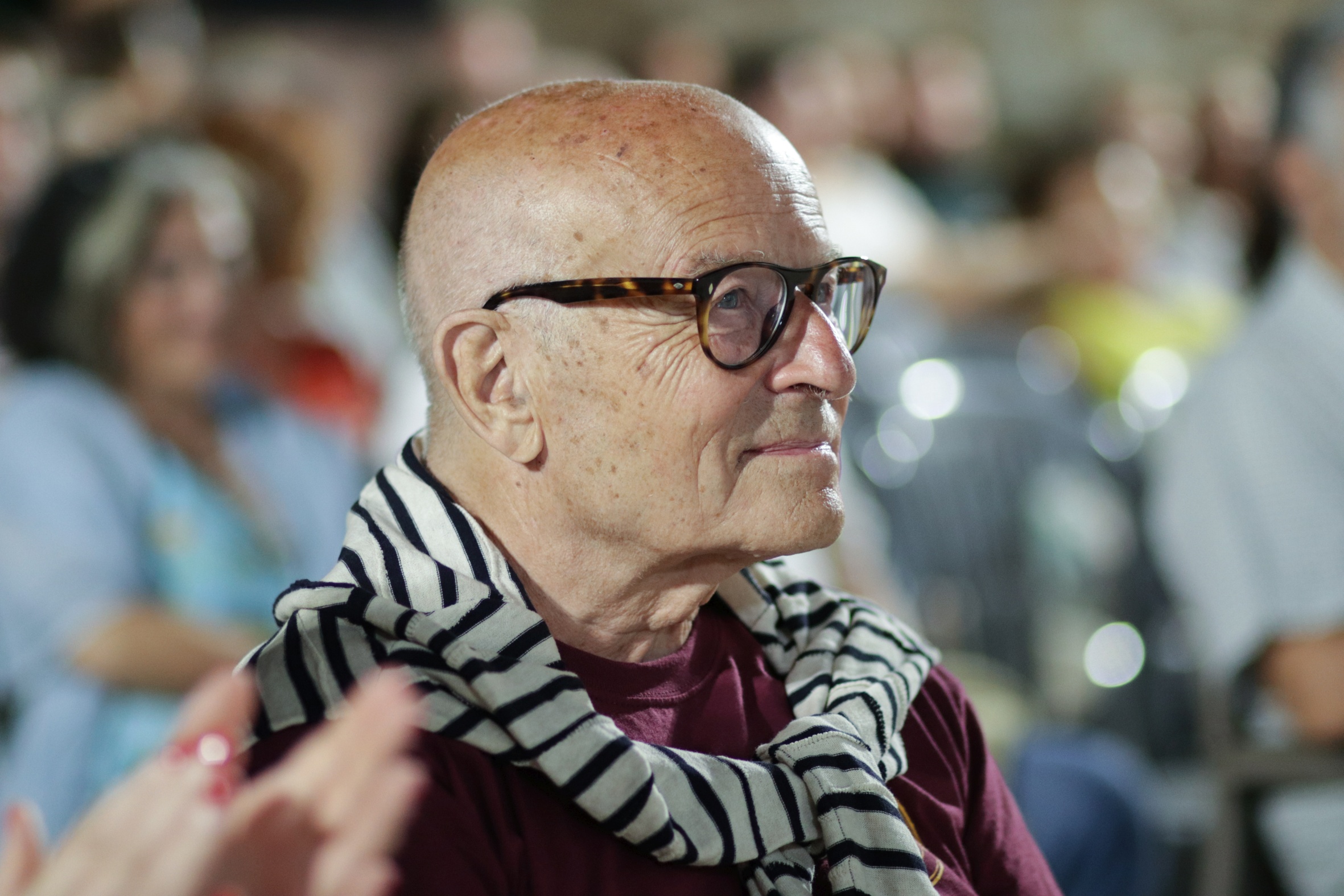
Volker Schlöndorff presented his film at the open-air cinema Apollon in Edipsos. Photo: Evia Film Project.
Does Volker Schlöndorff think that one man can change a continent? He was not telling the truth when he said it was mostly alone. Yes, he’s not followed by a lot of people, but his method by now is spreading from one farmer to another from one village to another. And then there are NGOs who take it from one country to another. Tony works for World Vision, which is another big thing. And then all these NGOs who were developing agriculture formed an alliance, Tony, himself, it was put it that way, it’s not about changing agriculture, it’s about changing mindsets. You should know, that when people become aware, you can take your destiny into your own hands. Do it yourself, there are many ways to do it. And in this way, he says once people understand that they can actually make a change themselves, everything changes, whereas the usual development or aid, and politics are all aiming at feeding them, bringing them food doing this, doing that, but not to develop their own capacity.
As for the new generations, they are aware of the difficulty of managing in a context of precariousness, Like the children in school, they say no, we don’t want to be farmers like our parents. Of course not under those circumstances when they see that their parents work hard and cannot feed the family. That’s not an encouragement, of course. Three things are essential for this to change: education, mechanization, and electrification. Schlöndorff regrets that studies are underway to set up power plants in the Sahara to transport electricity to Europe, But there are no plans on how to do it in the villages in Africa, where they are needed more than ever.
It is indisputable that politics, ecology, and social issues are more closely linked than ever, and the battlefield has shifted to environmental issues, both in the first and the third world, Schlöndorff acknowledges that Ecology is the key to progress for sustainability for everything. In the last 60 years, billions have been pumped into Africa. If all the trees that have been planted had grown, there would be a dense forest. But in fact, the money never got there, Tony says “I’ve never seen any money arriving in a village”. At best, they drill really well. But then they leave the people with the rope or a donkey to take up the water. It’s just such small steps. When the money vanishes, that money is all lost to politicians, and also to development organizations. However, The Forest Maker does not focus on the obvious complaint, I could have made a completely different film, like about the Great Green Wall and all these millions of money left, I only say three lines. Tony told me “Look, don’t lose your time fighting corruption in the movie, it will not change it anyhow. Everybody knows that”. And that’s why I ended up focusing on the life of the farmers and how resourceful they are, and how much they could change if the focus was put on their work.
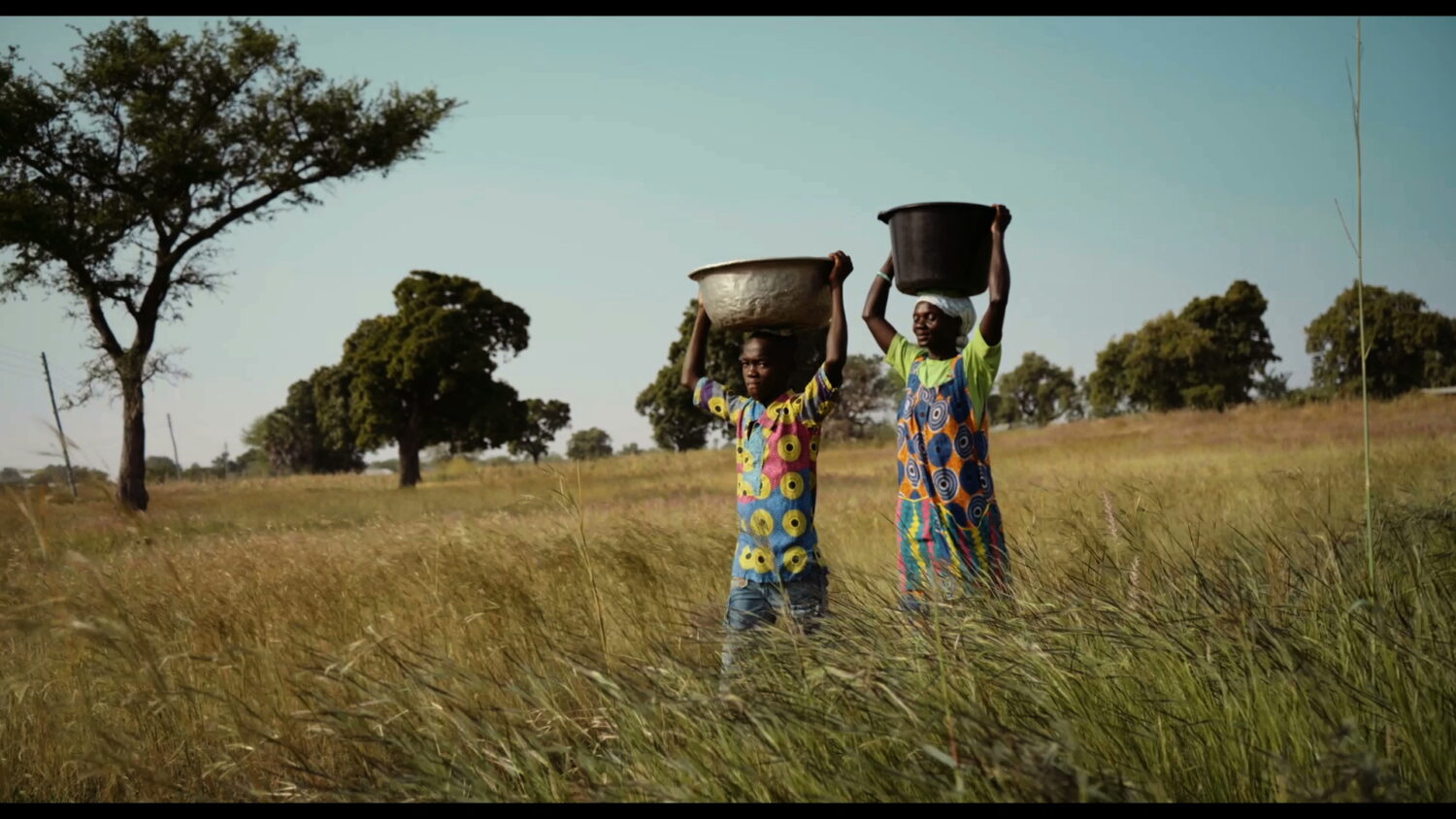
Asked about the biggest revelation he had received during the making of The Forest Maker, the German director confessed that My surprise was those young people in the city of Dakar voicing that they want to get out in the country if they are given a piece of land to develop a different kind of agriculture. Undoubtedly, a message of optimism for a continent where women, as Volker Schlöndorff states, are the ones who carry Africa on their heads.

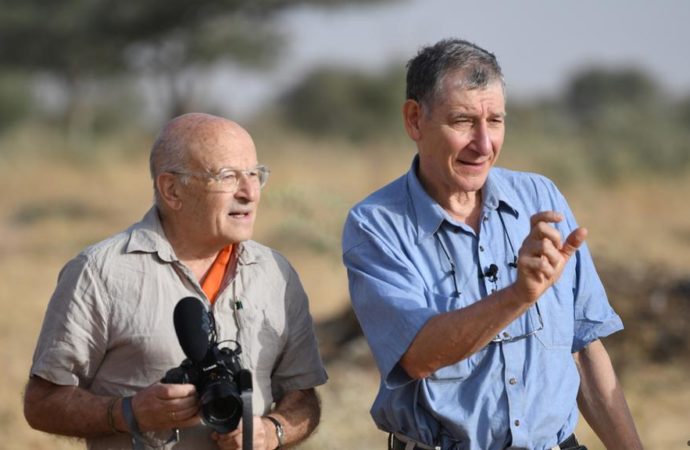

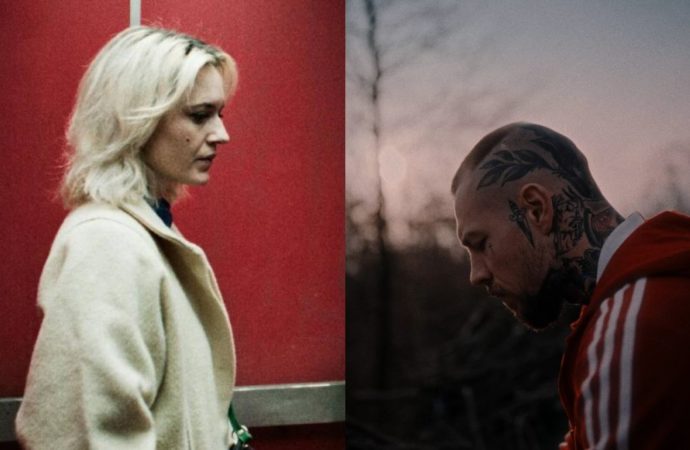
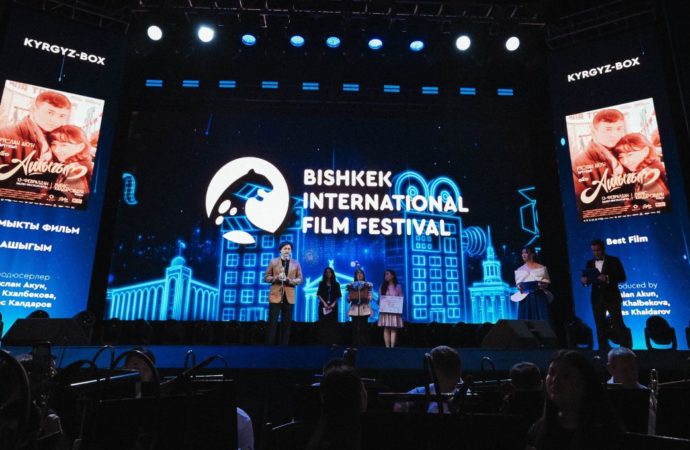
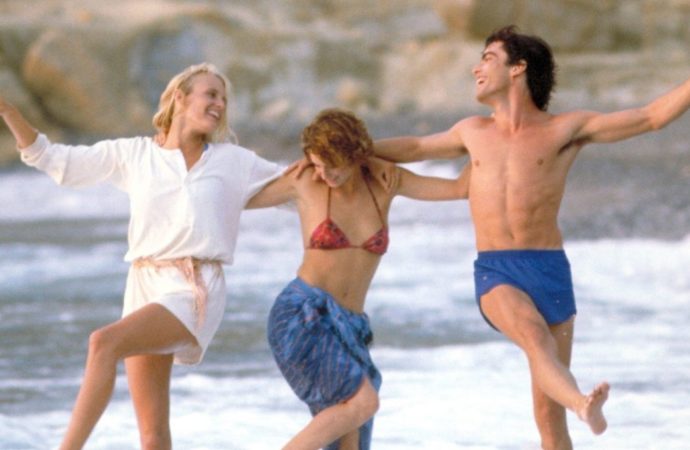
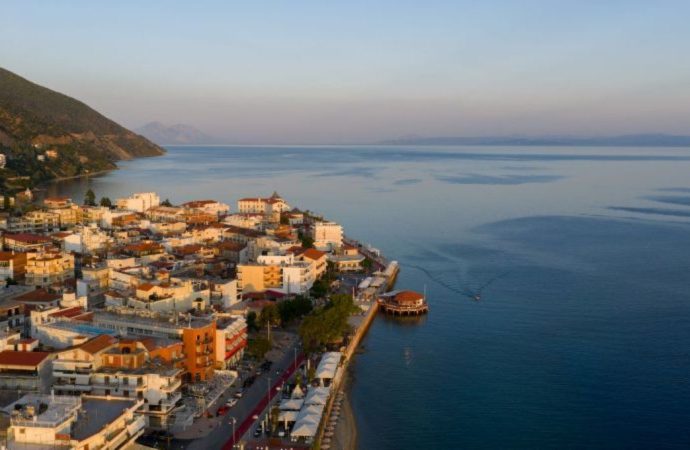
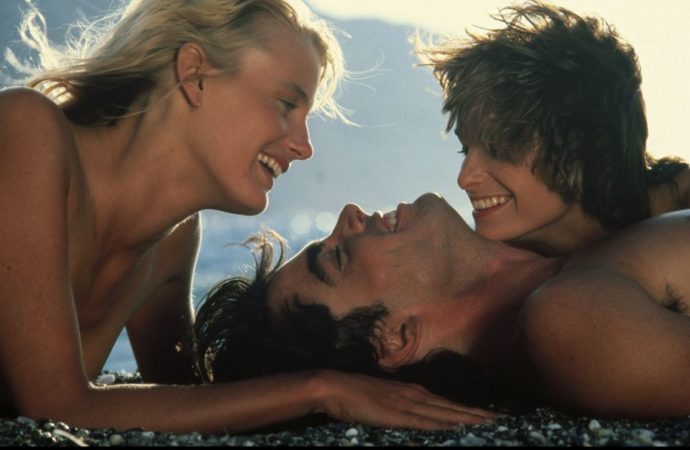

No one has posted any comments yet. Be the first person!